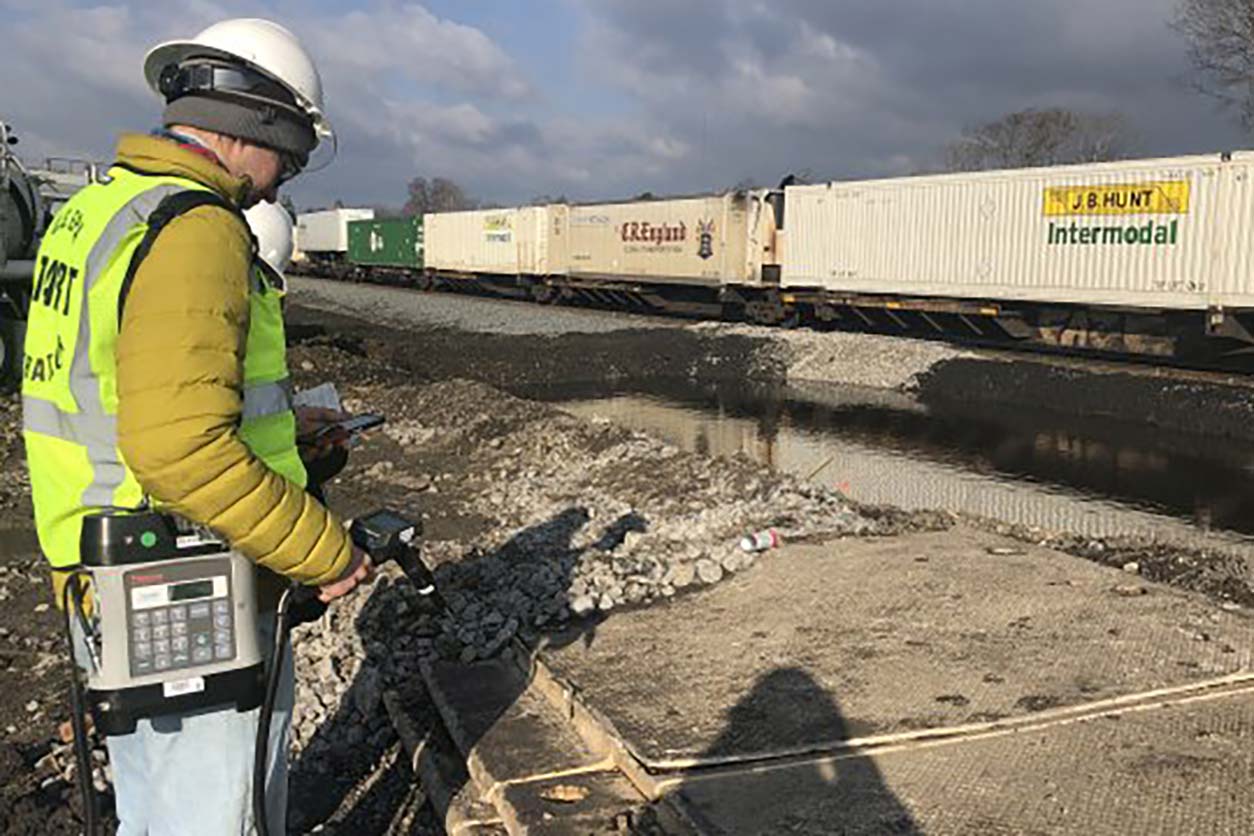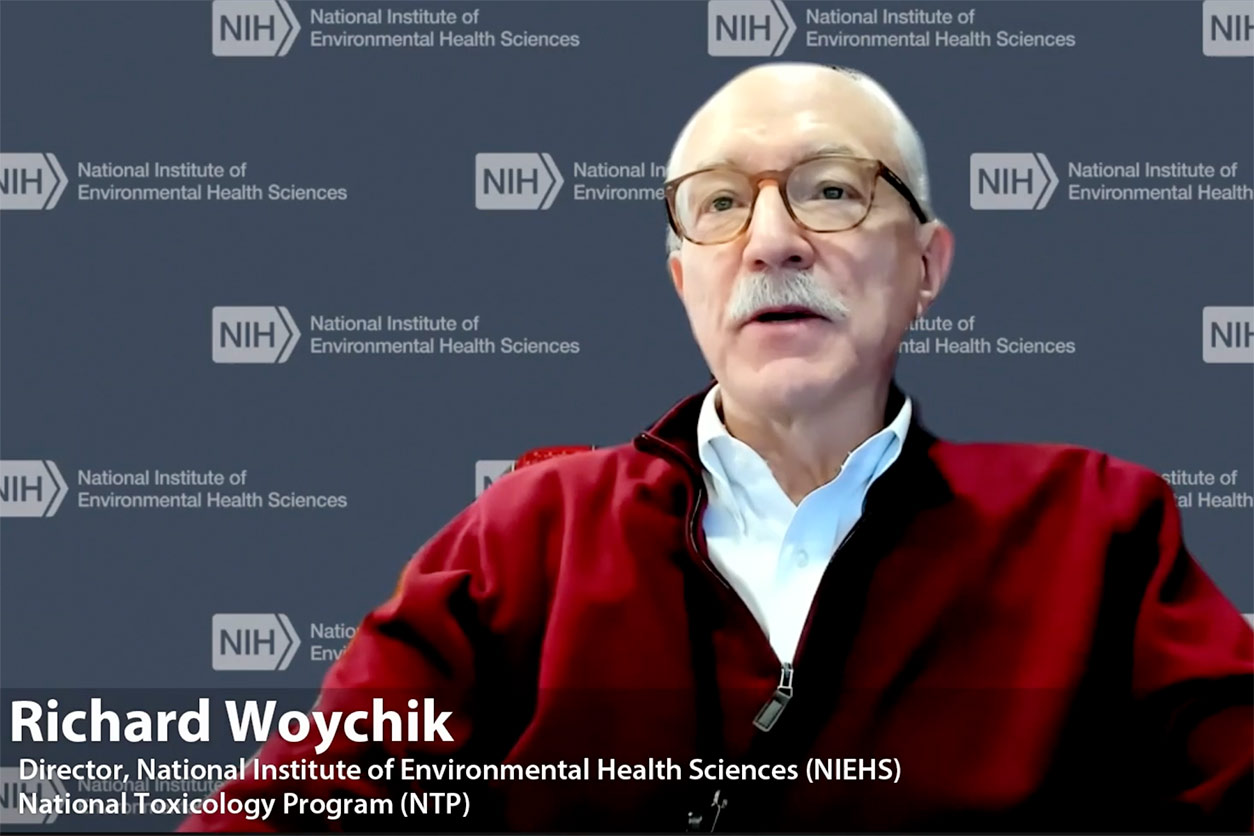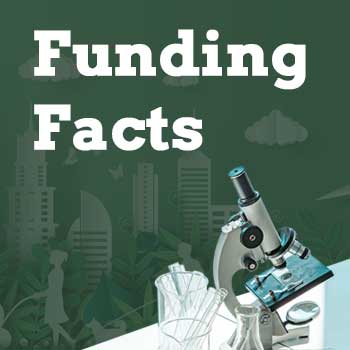It was the evening of Feb. 3, 2023, when a Norfolk Southern Railway Company (Norfolk Southern) train carrying hazardous materials derailed in the village of East Palestine, Ohio. Some of the train cars caught fire and some spilled their loads onto the ground. These substances traveled into local waterways and flowed miles downstream.

For the past year, many local, state, and federal agencies, including NIEHS, have been part of a coordinated response to support the communities affected by the derailment in East Palestine and surrounding areas of Ohio and Pennsylvania. From the early days of the disaster, NIEHS has been actively engaged to understand the community concerns about potential health impacts, and to identify opportunities for needed research. Much of this was done through the National Institutes of Health (NIH) Disaster Research Response (DR2) Program.
During a visit to East Palestine Feb. 16, 2024, President Joe Biden acknowledged the “herculean efforts” made by the community and agencies since the tragedy.

President Biden announces six new research grants
During his visit, the president announced, “the award of six National Institutes of Health grants to some of America’s best research institutions to study the short- and long-term impacts of what happened here.”
These six NIH awards were made by NIEHS, through its Time-Sensitive Research Grants Program, to conduct research and community engagement activities in East Palestine. Many of the grantees have already been working in the area and have established good working relationships with the community.
Case Western Reserve University
Principal Investigator: Frederick Ray Schumacher, Ph.D.
- This research team will engage community partners and talk with East Palestine residents to better understand their experiences and concerns during and after the disaster. The team will also collect, and store for future research, blood and saliva samples and analyze them to understand how the mixtures of chemicals impact health both short- and long-term.
Texas A&M University
Principal Investigator: Natalie Johnson, Ph.D.
- The team will apply a mobile air sampling strategy to rapidly characterize potential health risks from hazardous volatile organic compound (VOC) exposure in the aftermath and recovery phases of the East Palestine environmental disaster.
University of California, San Diego
Principal Investigator: Beatrice Golomb, M.D., Ph.D.
- The researchers already have a community partnership in East Palestine, Ohio, and have conducted interviews with affected residents. They will begin recruiting a cohort of residents to assess the short-term (approximately two to three years) health impact of being exposed to a mixture of toxins.
University of Kentucky
East Palestine Train Derailment Health Tracking Study
Principal Investigator: Erin Haynes, Dr.P.H.
- This research project will include a health tracking study (via an online survey) to collect longitudinal measures of health symptoms, stress, and well-being of East Palestine residents. A researcher network will also be established to help successfully report back and disseminate research findings to the community.
University of Pittsburgh
Profiling the Post-Accident Exposome in East Palestine
Principal Investigator: Peng Gao, Ph.D.
- This research project will collect soil, water, and sediment samples to capture the extent of the contamination and to document the ongoing impact on the local environment of this region and its highly interconnected waterways.
University of Pittsburgh
East Palestine Community-Engaged Environmental Exposure, Health Data, and Biospecimen Bank
Principal Investigator: Juliane Beier, Ph.D.
- This research project will use citizen science strategies to actively engage community members in collecting environmental samples, biospecimens, and health outcome data to better understand the interaction of psychosocial stress and vinyl chloride exposure on their health, and to find ways to reduce the immediate and long-term impacts of these exposures.
NASEM virtual workshop
Prior to the grants being announced, NIEHS and its partnering NIH institutes supported a workshop that brought together community members and health and research experts to better understand the health impact of the rail disaster.
The virtual workshop, “Public Health Research and Surveillance Priorities from the East Palestine Train Derailment,” was convened Nov. 6-7, 2023, by the National Academies of Sciences, Engineering, and Medicine (NASEM). This workshop was funded by NIEHS, with support from the Eunice Kennedy Shriver National Institute of Child Health and Human Development, the National Cancer Institute, the National Institute of Neurological Disorders and Stroke, the National Institute on Aging, the National Institute of Mental Health, and the Centers for Disease Control and Prevention/Agency for Toxic Substances and Disease Registry.
NIEHS Director Rick Woychik, Ph.D., opened the two-day workshop, which explored potential health impacts and lessons learned from the incident. The goal: identifying research questions specific to affected communities in East Palestine and surrounding areas.

Aubrey Miller, M.D., deputy director of scientific coordination at NIEHS, closed the impactful meeting with a heartfelt message about the need to do more to help the community heal.
“What heals and sustains devastated populations over the long term involves translating data into effective preparedness, responsive systems, and future-looking recovery efforts that people can trust,” Miller said. “By working together across sectors, we could help the community heal.”
The Proceedings of a Workshop-in Brief report, which NASEM released in early January, set the stage for the NIEHS funding that was announced in February.
(Robin Mackar is a writer and media relations coordinator in the NIEHS Office of Communications and Public Liaison.)









